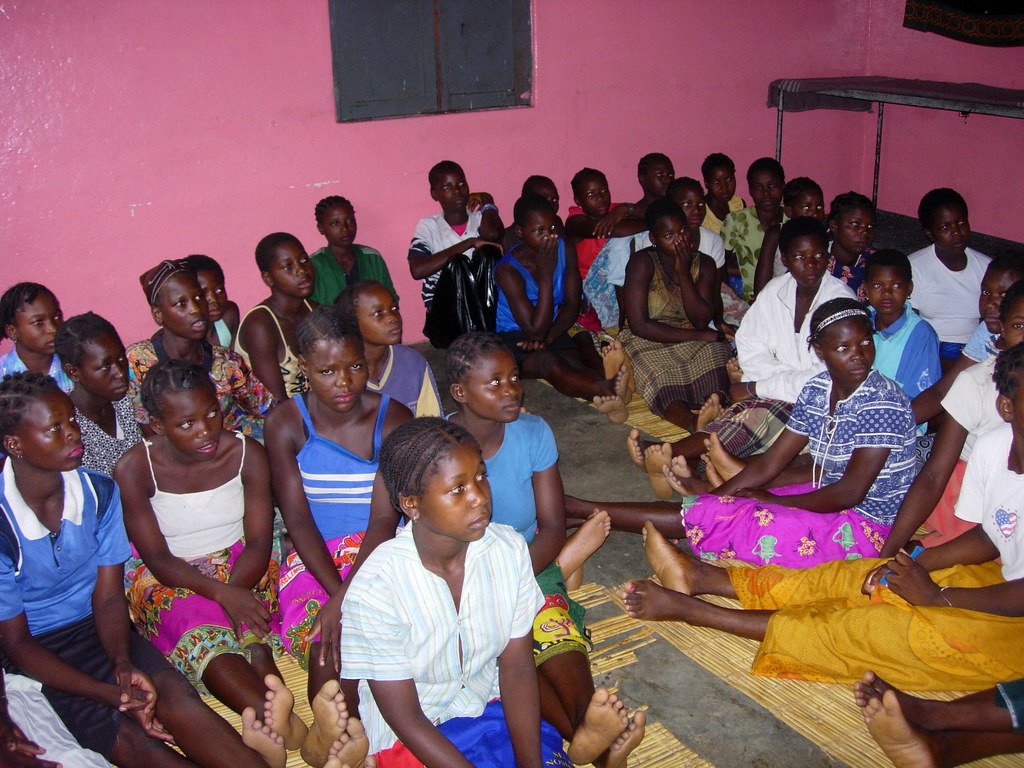On July 18, the Assembly of the Republic of Mozambique passed a law criminalizing marriage between an adult and a person under the age of 18.
The new law states [2] that an adult who marries children and adolescents is to be punished with up to 12 years in prison, and a family member who forces the child to accept marriage will be punished with up to eight years.
Upon the law's approval, members of civil society organizations, who have pushed for such a law for years, shared hugs and smiles.
Mozambique has one of the highest rates of premature unions in the world. A study by the Southern Africa Network against Child Trafficking ranks Mozambique the 11th country in the world with the highest rates of such unions and the 2nd among the countries of Southern Africa.
Official statistics [3] indicate that about 500,000 Mozambican women aged 20-24 married before the age of 18, and about 57,000 married before their 15th birthday.
According to several studies, premature marriage is a decisive factor for girls to drop out of school. It also exposes them to sexually transmitted diseases such as AIDS or obstetric fistula, which contributes to maternal and child mortality.
The president of the Children's Parliament — a civic organization working with children and adolescents from Mozambique — Kino Fernando Caetano said that:
A lei recentimente aprovada constitui uma grande alegria e vitória para as crianças e a sociedade moçambicana no geral. A lei é resultado de um verdadeiro esforco conjunto, que envolveu o Governo de Moçambique (MGCAS), a Assembleia da República e a Sociedade Civi (CECAP).
The recently-passed law is a victory for children and Mozambican society in general. The law is the result of a true effort involving the Government of Mozambique (MGCAS), the Assembly of the Republic and the Civi Society (CECAP).
Challenges after law approval
Speaking with Global Voices, Dércio Chiemo [5], a local teacher and social activist, points out that while the law is a victory for all actors working to eradicate premature marriages, the communities that still engage in the practice will need support:
É uma vitoria para as organizações que se uniram e lutaram para que essa proposta de lei fosse aprovada. É também uma grande vitoria para todas aquelas vozes e gritos que não se faziam ouvir: gritos de raparigas que foram obrigadas a se casar prematuramente, sem a sua vontade sem o seu consentimento, sem ser ouvidas. […]
[Mas] Não podemos pensar que [pelo] facto de existir essa lei os casamentos prematuros vão parar, isso demostra que a partir de hoje temos que começar a trabalhar para que as pessoas tenham o conhecimento da lei e com isso ajudar a diminuir ou mesmo acabarmos com os casamentos prematuros.
It is a victory for the organizations that came together and fought to get this law passed. It is also a great victory for all those unheard voices and screams: screams of girls who were forced to marry prematurely, unwillingly without their consent, without being heard. […]
[But] We can't think that [only because] this law exists, premature marriages will end, it shows that starting today we will have to start working so that people have the knowledge of the law and thus help to decrease or even end premature marriages.
For Júlio Mutisse [6], a bachelor of law from Eduardo Mondlane University, the problem of premature marriages go beyond the legal issue, as it's necessary to understand the phenomenon as a whole:
O desafio é grande gente. Ultrapassa a aprovação da lei. Tal como eu vocês estão cientes que o país tem muitas e boas leis com medidas sérias sobre determinados comportamentos mas continuamos a assistir a esses comportamentos recorrentemente.
É um bom passo sim, mas há que entender este fenômeno e atacar suas causas. Por que é que o casamento estava regulado do jeito que estava antes? Como era a sociedade? Este fenômeno é novo? Temos que trabalhar nas causas e com muita acuidade.
The challenge is big. It goes beyond the approval of the law. As we know, our country has many good laws with serious measures about certain behaviors but we continue to witness those behaviors repeatedly.
That's a good step, but you have to understand this phenomenon and tackle its causes. Why was the marriage regulated the way it was before? What was society like? Is this phenomenon new? We have to work on the causes and with great wit.
Meanwhile, Fernando Moiane [7] states that the biggest problem lies in the customs and cultural habits of Mozambicans:
Precisamos sim combater os casamentos prematuros mas eu acho que o parlamento fez pouco o tpc pos [sic] esta lei nao encontra suporte naquilo que é a cultura , usos e custumes dos Mocambicanos [sic]. Para me [sic] esta lei esta condenada ao fracasso pos [sic] nao [sic] reflete nada ao conjunto de usos e custumes seculares do povo africano no geral e Mocambicano [sic] em particular.
PS: preparem as cadeias para irem recolher todos os homens de Chibuto, Homuine, mutarara, macomia etc.
Yes, we need to fight against premature marriages but I think that parliament has done little work, this law finds no support in what is the culture, uses and customs of the Mozambicans. For me, this law is doomed to failure since it does not reflect the set of secular uses and customs of the African people in general and Mozambican in particular.
PS: Prepare the chains to collect all the men from Chibuto, Homuine, Mutarara, Macomia, etc.
